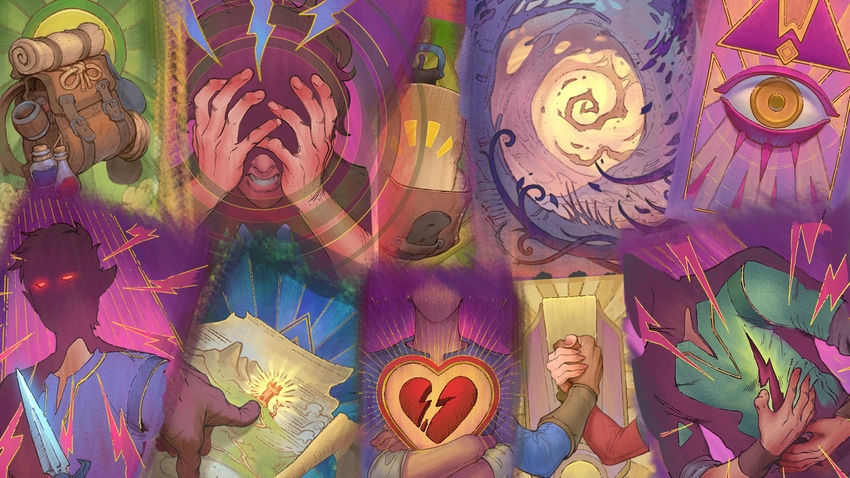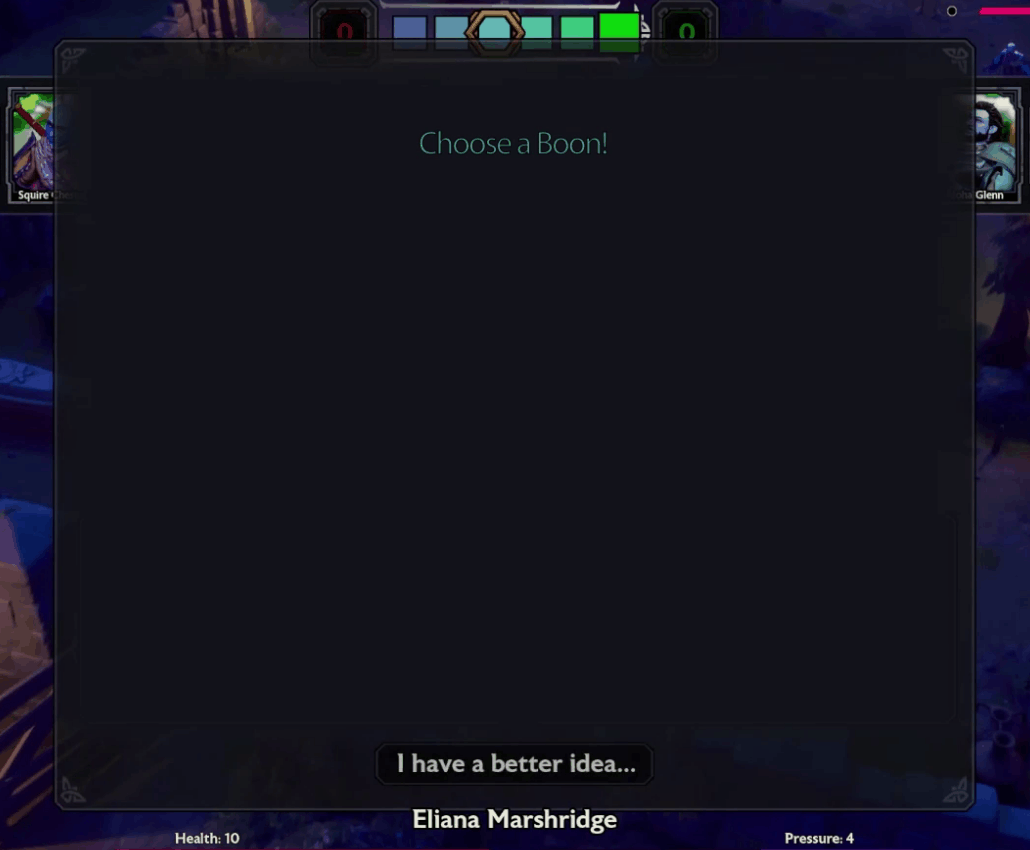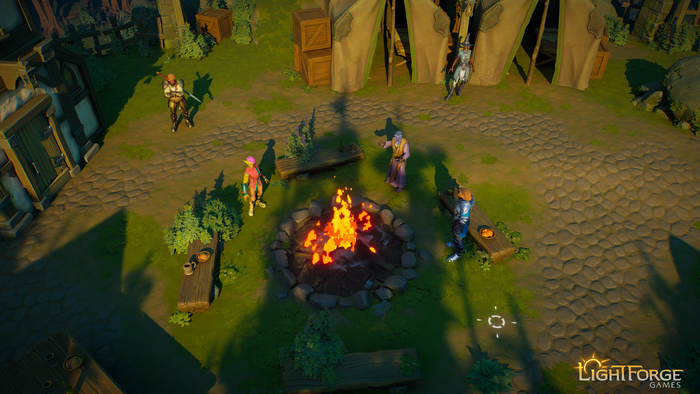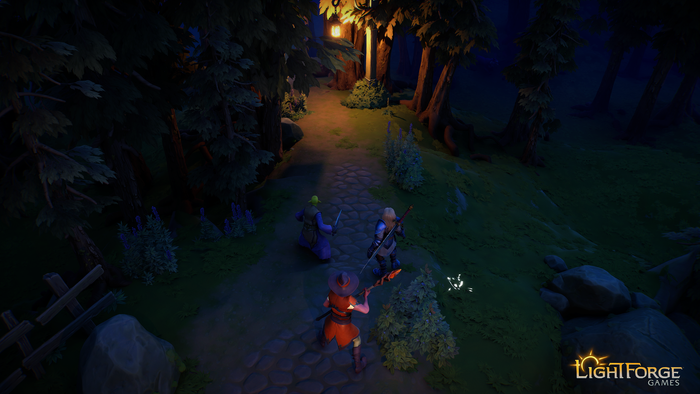
Featured Blog | This community-written post highlights the best of what the game industry has to offer. Read more like it on the Game Developer Blogs.
Evolving standard dice roll game design with Project O.R.C.S.' boons and banes system
We set out to create a game that's simple and fun to play while giving players the freedom to add whatever tweaks they’d like.
March 4, 2024

Dice are the heart of almost any tabletop roleplaying session. They may not decide what you do, but they decide how successful you are and which general direction the session will go in. Go on a hot streak with nat 20s? You’ll never miss a shot. Run out of luck? Your session will go in the opposite direction.

We knew from the beginning that we wanted a dice roll mechanic in Project O.R.C.S. – which stands for Online Roleplaying with Collaborative Storytelling – but we didn’t want the binary hit and miss system that came with it. Instead, we wanted our dice system to act as a true engine for storytelling.
That’s where our Boons and Banes system comes in. This system, which we affectionately call “baboons” for short, augments dice results with more interesting outcomes tied to their character’s traits, the environment around them, the action they’re performing, and other elements.
Each time a player rolls, they choose from developer curated prompts randomly selected based on the result. Anything above a 15 grants a choice of Boons and everything below grants a choice of Banes. They’re essentially cards you draw after rolling, choosing the one you like best. This gives players a level of agency and creativity in determining what happens when they roll.

An important thing to know about our game is that you never miss. Might sound weird, right? We don’t think so. Think of it like Captain America’s punch. Steve Rogers always has an immense amount of power when he knocks someone back. Sometimes he punches someone so hard that he knocks out the Hydra officer behind them, too. Other times he hits someone so hard they fly into a gas tanker, causing a huge explosion with collateral damage.. Without missing there are still dramatic story moments tied to that punch.
Back to Project O.R.C.S. – say you’re casting a spell to light a bush on fire in order to cause a distraction. You’re going to successfully light that fire . Rolled a 20? You lit the bush on fire, and maybe the Boon you selected says you also caused the enemies to get so scared they ran away. Rolled a 5? The bush is still on fire, but your selected Bane says you also lit your clothes on fire in the process. Woops! Now you have to deal with that complication.
The Boons and Banes system is a virtual improv partner whose answer is always “yes, and” or “yes, but.” This creates that engine of storytelling we were looking for where one action always leads to the next.
Encouraging Role Play through Roll Play
One of the primary goals of Project O.R.C.S. was to provide an on-ramp to the tabletop roleplaying experience. The core of that experience is player creativity. We want players to feel comfortable expressing themselves, which can include everything from deciding how they sneak into a camp full of cultists to trying on an entirely new voice when they have a conversation.
Taking on that level of creativity can be intimidating, especially for people who aren’t experienced at this. Given that we want to appeal to new and existing fans of this genre alike, our main challenge came down to how you inspire people to be creative while maintaining the flexibility fans expect.

Gameplay within Project O.R.C.S. is always punctuated by these Boons and Banes. They're small and digestible so they're easy to tackle for someone who came into a session with no previous knowledge or experience. They also provide simple prompts for players that inspire creativity. One of our design values is “Avoid the Blank Canvas” because a blank canvas is intimidating, especially to new players. A prompt, however, gives direction and is easy for new players to respond to.
These prompts, however, are also open ended enough that experienced roleplayers still have the room they need to express themselves. In fact, if they had a very specific idea in mind, a little unassuming button on the bottom of the screen labeled “I have a better idea…” allows them to ignore the prompts and work with the Guide on a different outcome.
The Heartbeat of Project O.R.C.S.
This system is also a wonderful example of how we can expand on the tabletop experience in ways that just wouldn’t be possible outside of a video game. Here we have a huge virtual deck that can be pulled out and augmented at a moment’s notice based on all sorts of contextual clues. That sort of system, one that both enhances creativity and session efficiency, just isn’t possible in traditional tabletop due to the limitations of physical cards.
Baboons, which is just so much easier to say when you’re talking about Banes and Boons a dozen times a day, is a system that comes up constantly as you play. The dice fly out of players’ hands just like any other tabletop session, and now every roll both describes what just happened and points toward what happens next. Baboons are the core driver of how dice impact the story and are therefore the heartbeat of our gameplay.
Boons, Banes, And Beyond
Boons and Banes started as a way to enhance the way players interact with the dice, but they eventually became a much bigger part of the game due to their success.
We’ve extended the idea of random prompts into many other systems. The “no homework method” of going on quests uses similar prompts to help players design a quest as they’re about to play it. The mission rewards system at the end, where players vote on how well everything went, uses a similar mechanic to add a fun and random layer to how a session wraps up. We even use them to help players introduce themselves when starting a new character!
We set out to create a game that’s simple and fun to play while giving players the freedom to add whatever tweaks they’d like. Systems like Boons and Banes serve both of these goals well by making it easy to be creative. They’re a great example of how we identified a problem, built a mechanic to solve it, then expanded it further into the game once it proved fun.
Read more about:
Featured BlogsAbout the Author(s)
You May Also Like









